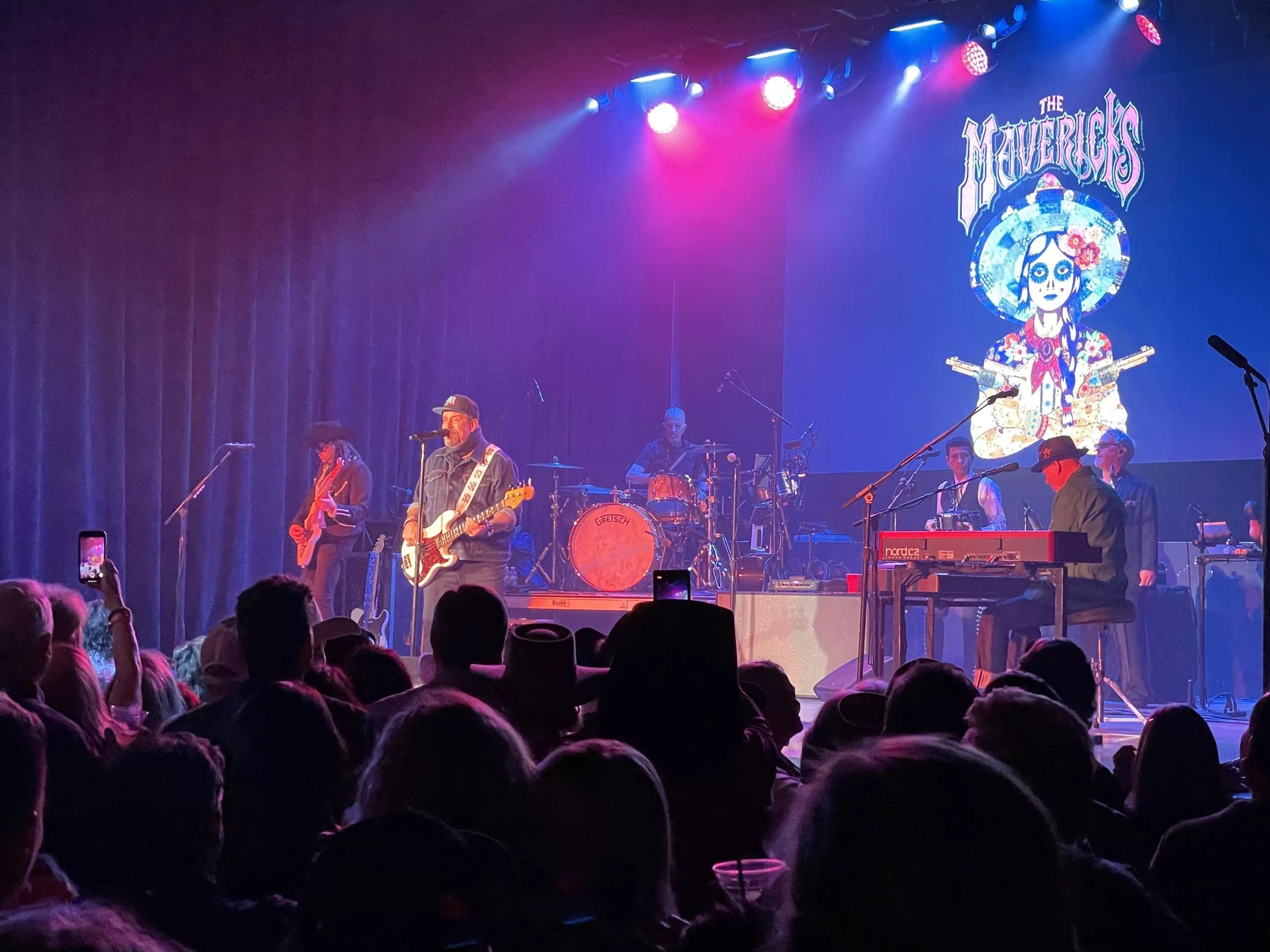
Preston Jones

Audio By Carbonatix
The Mavericks had temporarily departed the stage – a quick breather before the two-song encore – and the ecstatic howl from the crowd crystallized the night in a single word, repeated at high volume: “More! More! MORE!”
The near-capacity crowd tucked into Tannahill’s Tavern and Music Hall, a cozy space within the sleek Mule Alley addition to Fort Worth’s venerable Stockyards, was rowdy and ready for all the Mavericks had to give it, fiending for more, even though Raul Malo and his bandmates had just spent about 80 minutes delivering one of their trademark performances packed with fire, feeling and funkiness.
Malo, alongside guitarist Eddie Perez, drummer Paul Deakin, pianist Jerry Dale McFadden, percussionist and trumpeter Lorenzo Molina, accordion player Percy Cardona, saxophonist Max Abrams and trumpeter Julio Diaz, seemed content to let the music do the talking Friday, for the band’s first of two nights in Fort Worth. (Friday’s performance was the band’s first in North Texas since a show at Dallas’ Majestic Theatre last September.)
A band conversant in country, jazz, pop and Latin-flavored rhythms, finely honed by its relentless dedication to touring, the Miami-formed Mavericks breezed through all phases of its eclectic catalog Friday.
The night, which ultimately ran about 95 minutes in all, began by pulling from the octet’s masterful 2020 LP En Español – a potent one-two punch of “Poder vivir” and “Recuerdos” – and reached back to the early 1990s, showcasing “There Goes My Heart” and “O What a Thrill” from 1993’s What a Crying Shame, and “Back in Your Arms Again,” from the 2013 LP In Time, the release of which kicked off the band’s current era of activity, which has endured for 11 years thus far.
Throughout, the Mavericks were reliably kinetic and locked tighter than a bank vault, although Friday’s set did have one unusual sight, at least on stage: Malo playing bass, alongside his typical lead vocal duties.
While the band has featured a few different bassists throughout its existence – Robert Reynolds held the role until 2014, followed by Ed Friedland, who parted ways with the group last year – Malo is no stranger to the low end. In addition to singing, playing guitar and writing songs, he also played bass on the first two Mavericks LPs (1990’s self-titled debut and 1992’s From Hell to Paradise).
Regardless, the core four – Malo, Perez, Deakin and McFadden – were generous in sharing the spotlight throughout the evening, as Molina, Cardona, Abrams and Diaz took turns stepping to the front of the stage and punctuating the revelry with bursts of accordion, brass or woodwind panache. Diaz, in particular, nearly stopped time with his contributions to the gentle Tex-Mex sway of “Sabor a mi.”
Malo’s sonorous, singular voice – about which we have rhapsodized again and again and again – was in fine fettle Friday, handling the giddy enthusiasm of “As Long As There’s Loving Tonight” and “All Over Again” with as much skill as the tender readings of Ernest Tubb’s “Waltz Across Texas” and Duane Dee’s “Before the Next Teardrop Falls.” That he was also so visibly enjoying the raucous energy of the room only added to the thrill of it all.
The palpable joy from hearing and seeing the Mavericks do what precious few of their contemporaries can – Perez’s visceral guitar work, popping the strings of his guitar with a unmatched flourish; McFadden’s appealingly loose-limbed piano playing, egging the audience on from first note to last; Deakin’s rocksteady timekeeping, tucked away on a kit in the corner of the stage; Malo’s luscious voice wrapped around bilingual lyrics, a riveting anchor amid the musical maelstrom – is intensified inside a room so clearly primed to receive what’s being offered.
A Friday night crowd in the Stockyards is, by default, more ready than most to cut loose and have a good time. Those gathered inside Tannahill’s on Friday were only too happy to lose themselves in the bliss of great music performed well.
Lubricated with melody and mood (and, sure, a healthy splash of alcohol), the nearly full room often seemed to move as one, following the shifts in spirit accordingly – pairing off for gentle, shuffling dances during the down-tempo moments and losing its collective mind in ecstasy during the climactic “Dance in the Moonlight” or the encore’s “Come Unto Me” and “All You Ever Do is Bring Me Down.”
The Mavericks have now been recording and touring for longer than they did during their first iteration. Some of that renewed longevity is likely attributable to the fact that the potent, polyglot blend of styles was ahead of its time in the 1990s, especially at a moment when country music, the genre through which The Mavericks entered the musical mainstream, was so enamored of slick, pop-glossed fiddle tunes.
The collapse of firm borders between genres has served the Mavericks well, further aided by the fact that even the band’s 30-year-old material has aged like fine wine.
But beyond that, there’s a sense the band is simply having too good a time to contemplate stepping away again for any extended period. The Mavericks understand it as well as the audiences do: The only true disappointment about any Mavericks gig is that it has to end at some point. After all, if you can sustain such pleasure indefinitely, why stop?
Or, as the wise, possibly tipsy man screaming from somewhere in the darkness behind me Friday night succinctly put it: More!